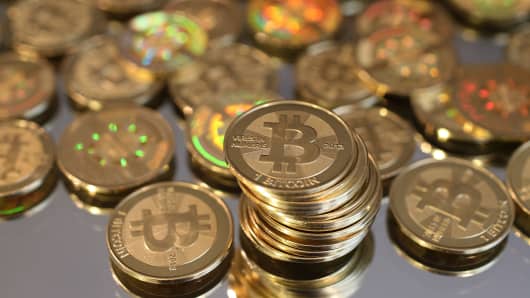In the $2 trillion market for exchange traded funds, they are calling it the "Winkle wrinkle".
The recent proposal from the controversial Winklevoss twins to launch an ETF that tracks the volatile virtual currency known as Bitcoin has been met with skepticism from industry insiders.
The Bitcoin ETF will probably never hit the market because it is too difficult for "authorized participants" and "market-makers" – the banks and trading firms that typically sustain such funds – to profit from discrepancies between the underlying asset and the ETF, they say.
(Read More: Critics unfriend Facebook twins' Bitcoin fund)
The suspicions cast over the proposed Bitcoin ETF are perhaps the starkest example yet of the complex cast of financial characters and motivations needed to launch investment vehicles that attempt to provide quick and easy access to sometimes esoteric and thinly traded assets.
"Bitcoin itself is not even a developed market, let alone to build an ETF on top of it," says Reginald Browne, managing director at KCG Holdings, formerly Knight Capital, and a key figure in the development of the funds, which have surged in popularity over the past two decades.
Mom and pop investors, as well as larger institutional investors such as pension funds and insurance companies, have rushed into roughly 3,400 ETFs in recent years, using the vehicles that trade like stocks on exchanges to place their money into a wide range of assets.
(Read More: Bitcoin ATM gets ready for roll out)
The "Winklevoss Bitcoin Trust" will use fractions of the twins' accumulated Bitcoin holdings to give investors greater exposure to the virtual currency, according to a regulatory filing made early this month. Investors would initially get exposure to one-fifth of a Bitcoin for each ETF share bought. The Winklevoss twins plan to sell 1m shares, giving the overall fund a $20 million value.
A person familiar with the proposed Bitcoin ETF, which still needs to be approved by the US securities watchdog, says the fund has yet to recruit authorized participants, or APs. A spokeswoman for the Winklevoss twins, Tyler and Cameron, declined to comment on the matter.
Authorized participants are essential to building the funds since they create and redeem the ETF shares, usually in exchange for baskets of the underlying securities, from the ETF sponsor.
APs typically sign on to support ETFs because they believe they can profit by "arbitraging" small differences between the price of the fund's shares and the underlying securities being tracked.
Read more from the Financial Times:
Winklevoss twins put faith in Bitcoin
Winklevoss twins From Facebook's enemies to Bitcoin traders
The Bitcoin believers
"If the ETF price trades above the NAV [net asset value, or the value of the ETF's securities], the APs buy the underlying assets in the market and convert them into ETF shares," JPMorgan analysts wrote in a recent note. "On the other hand, if the ETF price trades at a discount relative to the NAV, the APs buy ETF shares in the market and redeem them for the underlying basket."
That may prove difficult to do when it comes to Bitcoin, despite the Winklevoss's claims that APs to the fund will "have an opportunity to realize a riskless profit" by arbitraging the price of the fund's shares with the underlying price of the cyber coinage, ETF insiders say.
Many Wall Street institutions remain suspicious of the virtual currency, especially now that it has attracted the scrutiny of various regulators. It may also be hard to encourage big financial institutions that typically act as APs to trade such an uncommon asset as a crypto-currency.
(Read More: How Bitcoin is sacrificing its soul to survive)
ETF experts estimate there are roughly four dozen APs in the market.
These include: Bank of America Merrill Lynch, Barclays, BNP Paribas, Citigroup, Credit Suisse, Deutsche Bank, Goldman Sachs, JPMorgan Chase, KCG, Morgan Stanley, Nomura, Société Générale, UBS and Virtu Financial, which specializes in high-frequency trading.
"Most ETFs are going to have somewhere between five and 20 [APs]," says the head of ETFs at one large investment bank.
Some market-watchers are worried that APs may choose not to support ETFs in times of intense market stress. Last month at least one authorized participant suspended redemptions on ETFs after bumping up against its own internal risk limits during an intense sell-off in the market.
"There's not a lot of legal responsibility [in being an AP]," says the investment bank's head of ETFs, meaning most of them act as "at will" participants. "It's the combination of the real time arbitrage with the ability to balance out your inventory that's really the basis of the ETF market."
Still, many ETF issuers, market-makers and APs insist they will be there to support the exchange traded funds, even in turbulent times. Many expect that during bouts of intense market volatility, the price discrepancies between ETF shares and their underlying securities will simply intensify until they attract APs back into the arbitrage trades at the heart of ETF mechanics.
"I don't think we're ever going to have a situation where everyone just decides we don't want to make money," says one AP who declined to be named. When it comes to the Bitcoin ETF, however, that moneymaking opportunity for Wall Street banks and trading firms is harder to find.
Mr Browne, of KCG, says of the Bitcoin ETF: "There has to be some investment merit to bring an ETF to the marketplace and without that it is not going to be successful. Investors won't expand it, market-makers can't trade it."


